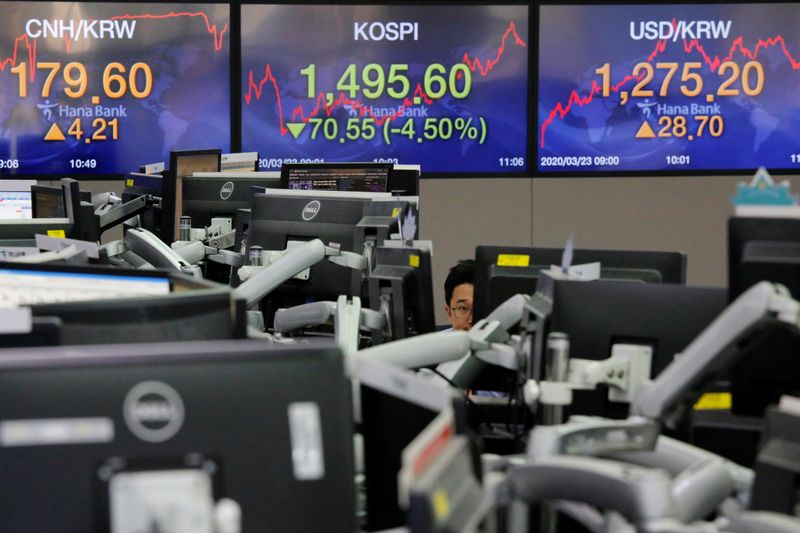This post was originally published on this site
https://i-invdn-com.akamaized.net/trkd-images/LYNXMPEG3053L_L.jpg
LONDON (Reuters) – World stocks were mixed on Thursday, as the death toll from coronavirus rose and economic pain deepened, with another record week of jobless claims expected in the United States.
Investors sought the safety of the U.S. dollar, which hung on to recent gains. Oil futures surged after U.S. President Donald Trump said he expected Saudi Arabia and Russia to reach a deal soon to end their oil price war.
In Japan, the Nikkei index ended down 1.37%, taking its losses to 25% so far this year. European stocks made tentative gains, with the pan-European STOXX 600 gaining 0.5%. Wall Street futures added 1.8% after plunging overnight.
“U.S. jobless claims are expected to surge again, and in this environment we cannot talk about a recovery in equities in the short term. The best you can hope for is stabilisation in the current environment,” said Francois Savary, chief investment officer at Swiss wealth manager Prime Partners.
In Europe, oil and gas stocks gained, with Royal Dutch Shell (LON:RDSa), Total SA (PA:TOTF) and BP (LON:BP) jumping 4% to 9.0%, thanks to the rise in oil prices.
Brent crude futures rose 11.0%, or $2.72, to $27.46. U.S. West Texas Intermediate (WTI) crude futures increased 10.14% or $2.08, at $22.39.
Trump said he had talked recently with the leaders of both Russia and Saudi Arabia and believed the two countries would make a deal within a “few days” to lower production and thereby bring prices back up.
Shares in British Airways owner IAG (LON:ICAG) added 3.0% after a person familiar with the matter said British Airways was in talks with its union about a plan to suspend around 32,000 staff so it can survive the coronavirus pandemic.
Euro zone government bond yields rose as investors cautiously moved back into riskier assets. The 10-year German government bond yield rose 4 basis points to -0.426%, pulling away from the lows of -0.55% touched on Monday.
The yield on safe-haven 10-year U.S. Treasuries – which falls when prices rise – fell as far as 0.5680%.
“There had been fears about the bond market blowing up, but for the time being there’s a return to normal correlation in the market, so we don’t see a vicious cycle where bonds bring down equities and equities brings down bonds,” said Savary.
U.S. labour market data is likely to provide the next test of market sentiment and of the pain in the world’s largest economy.
Initial claims for jobless benefits last week probably broke the previous week’s record of 3.3 million, with 3.5 million expected, according to a Reuters survey of economists.
Goldman Sachs (NYSE:GS) said on Thursday it expected the U.S. jobless claims to jump to a record 6 million for March 22-28.
“Jobless claims will be the timeliest hard data point for assessing the depth of the recession and catching the start of the recovery,” Goldman Sachs economists wrote in a note to clients.
DIFFICULT DAYS
China and South Korea have shown signs of controlling the virus, reporting falling numbers of new cases, but progress remains fragile and infections are soaring globally.
The World Health Organization said the global case count would reach 1 million and the death toll 50,000 in the next few days. It currently stands at 46,906.
Trump, who had initially played down the outbreak, told reporters at the White House on Wednesday that he is considering a plan to halt flights to coronavirus hot zones in the United States.
In currency markets, the dollar index against a basket of six major currencies stood flat at 99.625 after a gain of 0.53% overnight. The euro traded down 0.3% at $1.0934 as the dollar advanced.
Sterling reached a three-week high versus the euro and gained against the dollar on Thursday. It was last up 0.9% versus the euro at 87.81 pence per euro, its highest since March 11.
The Hungarian forint gained after the central bank used what analysts labelled an “implicit rate hike” to halt the slide of central Europe’s worst-performing currency.
Spot gold fell 0.1% to $1,589.71 per ounce.


